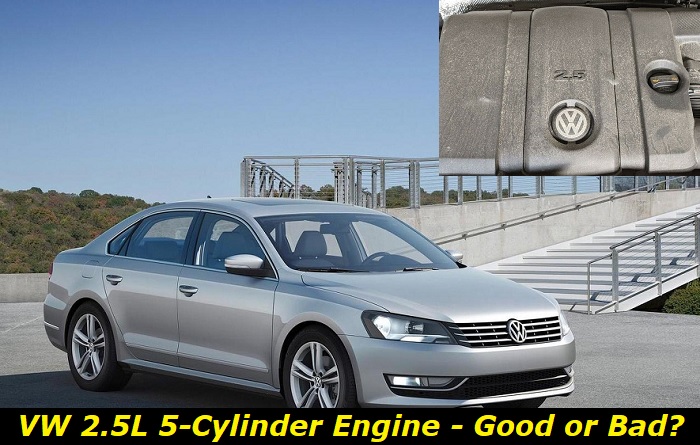The 2.5-liter 5-cylinder gasoline engine that was offered by Volkswagen in the North American market up until 2014 wasn't the most popular choice. But still, a lot of cars are equipped with this engine and there is so little information about it. We've decided to compensate for the lack of data and write our own article. We've even had a lot of personal experience with this engine in our team.
Today, we'll tell you more about the Volkswagen 2.5L R5 (5-cylinder) gasoline engine (CBTA) offered for Jetta, Passat, and some other models in America between 2008 and 2014. The earlier model of the 2.5-liter engine indexed BGP will basically have the same features, so the majority of facts in this article will suit that engine, too.

Key features and my opinion about the engine
- Production years:2008-2014
- Average lifespan of 2.5L R5 CBTA:220,000-240,000 miles
- Fuel supply type:port injection
- Power range:170 hp
- Fuel efficiency:awful
- Engine block material:cast iron
- Engine reliability score:high
- The most common problems:unreliable fuel pump, problems with electronic throttle, weak sensors, crankcase ventilation problems.
Key features of the 2.5L R5 engine by Volkswagen
So, it's not an international engine and it was exclusively sold in North America. We know it to be one of the base engines for the Jetta and Passat between 2008 and 2014. After that, the engine was discontinued and the TSI engines took its place on the market. This was one of the last non-turbocharged Volkswagen units offered to American buyers.
And was it good? We would say yes rather than no. Of course, this is not an ideal engine and it still has some problems and disadvantages. But even if you compare it to the clearest competitors like the 2.5L unit by Ford, for example, you will clearly see the important advantages of this simple and reliable engine.
Here are some features you may want to know:
- this is a 5-cylinder engine with 2.5 liters of displacement and 170 horsepower, it offers 20 valves, 5 cylinders, it has the cast-iron block;
- the timing system is powered by the chain which is pretty durable but still may cause some issues;
- the engine can take pretty much any gasoline, you can use regular or premium;
- the engine has nothing complicated in its technical construction, so it's very practical and easy to repair and maintain;
- you can expect it to shake due to the 5-cylinder construction, but some shivering will only be noticed when warming up;
- these engines have a great reputation for being reliable and long-lasting, also they don't bother owners with numerous minor problems;
- the only thing that will spoil your mood is fuel consumption, the mileage of a Passat 2.5 can be as bad as 15 mpg in the city.
Yes, if you look at all those official claims, you will find that the Passat 2.5 will show 22 mpg in the city and about 30 mpg on the highway. But once you take the automatic version of the vehicle and try active driving, the figures will be very disappointing. We've often seen less than 15 mpg during city driving.
This is a wonderful engine for highways where your gas mileage will be better than you expect. And the power supply is wonderful for high-speed driving. Also, we should tell you that the 6-speed automatic transmission is wonderful for this engine and it makes your driving pleasant and carefree.
What's the average longevity of the VW 2.5 5-cylinder engine?
The gasoline 2.5-liter engine offered by Volkswagen a dozen years ago in America is still popular in used cars. People often search for it and try to buy a Jetta or a Passat powered by this engine. Why? Because it's very durable and can last for decades without serious problems and expensive repairs.
We've seen a Passat with over 500K miles on it and the owner told us that the engine hadn't been even taken apart yet.
We believe the average longevity of the 2.5-liter 5-cylinder engine by Volkswagen should be about 280,000 miles. This is a fair figure. The engine can go more, but sometimes it's really expensive to drive more miles.
We believe that buying a vehicle with more than 200K miles on it is not wise. But if you own this car and you perfectly know that all oil changes and other repairs have been made correctly, you may still drive your vehicle for a couple of years.
If you are looking for a good used vehicle with the 2.5L R5 engine by Volkswagen, you should pay attention to cars with up to 150,000 miles on them. This will help you avoid serious issues and make sure you will drive this car for some years without paying a lot for the repair.
What are some of the common problems with the 2.5L 5-cylinder VW engine?
This is a very reliable and good engine that can easily survive over 280,000 miles with no major problems. And this is why we like this unit and would love to buy one if it's still in good condition. But you should understand that the engine is quite old in terms of technology and it's not the best unit for optimal gas mileage, oil consumption, vibrations, ecology, and some other important features.
Let's look at some of the most common problems that happen with this engine.
- The timing chain is not eternal
One of the possible problems is the stretched timing chain. Usually, it gives the first symptoms of stretching around 150,000 miles. If you don't notice it and keep driving, the chain may jump for a tooth or two. This will inevitably lead to problems with valves and pistons because they will hit each other hard.
If you hear that your 2.5-liter Volkswagen engine started rattling or is hard to start, you should immediately have it diagnosed and repaired. The timing chain kit and labor will cost quite a lot, so be prepared to spend some money.
- The fuel pump and filter are bad
Engineers didn't pay much attention to the fuel pump and fuel filter in these engines, so they keep failing. In our old Passat, we had to replace the fuel pump twice a year which is ridiculous for a German vehicle (by the way, most of them were made in Mexico, maybe this explains the problem).
The fuel pump needs to create solid pressure, but it fails to do it for a long time. So, a replacement will be needed soon after purchase.
- Ignition coils keep failing
Like in all Volkswagen cars, ignition coils will fail hard all the time. We mean we had to replace ignition coils nearly every time we replaced engine oil. It's not about all 5 coils, but at least one of them was broken by the time we had to have the oil and filters changed - every 10K miles or something like that.
Why do they keep failing? We believe there is a minor problem with wiring that infected nearly all 2.5L 5-cylinder engines. Because all owners have these problems and need to spend money on expensive coils.
- The coolant temperature sensor
We can say this problem is minor but for some people it's crucial. Why? Because your sensor may send some wrong signals to the ECU and the ECU will think there is a problem with the engine temperature. This may activate the limp mode or just stop your car in the middle of nowhere.
Usually, these sensors are broken spontaneously and they need replacement as the only possible way of fixing the issue. Also, if you don't see the engine temperature on your dash, you can easily overheat this engine and then spend money on a replacement unit.
How to drive your 2.5-liter VW vehicle for more time?
We have a habit of giving some tips to owners of vehicles that will help them drive their vehicles longer and experience fewer problems. The VW 2.5L 5-cylinder gasoline engine is certainly not a bad unit and it offers great advantages for the owner.
But stick to these simple rules to avoid problems:
- the oil change is needed at least every 10K miles, also change filters more often than the producer states;
- listen to all kinds of noises and vibrations - they may tell you about the timing chain condition;
- use clean fuel - if you pour some cheap and uncertified fuel into this engine, it will break down quite fast;
- have the electronics diagnosed every year to avoid problems with coils and other electric equipment;
- don't drive your car very actively - this is not a racing engine and it's made for calm family driving.
Final words
We loved this engine when we had the old Passat equipped with it. But now you can only buy the vehicle with the 2.5L 5-cylinder VW engine used. The youngest Jetta, Beetle, or Passat equipped with this engine will have over 8 years on it now. And this is a lot. So, be careful when checking the vehicle.
We still believe that this is one of the best Volkswagen engines in America. Unfortunately, they can't sell it now due to ecology issues and sharp rules for new cars.
About the authors
The CarAraC research team is composed of seasoned auto mechanics and automotive industry professionals, including individuals with advanced degrees and certifications in their field. Our team members boast prestigious credentials, reflecting their extensive knowledge and skills. These qualifications include: IMI: Institute of the Motor Industry, ASE-Certified Master Automobile Technicians; Coventry University, Graduate of MA in Automotive Journalism; Politecnico di Torino, Italy, MS Automotive Engineering; Ss. Cyril and Methodius University in Skopje, Mechanical University in Skopje; TOC Automotive College; DHA Suffa University, Department of Mechanical Engineering






Add comment